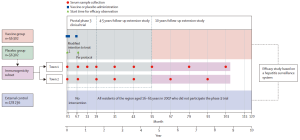Hepatitis E virus (HEV) ranks among the leading causes of acute viral hepatitis disease globally. Each year, approximately 20 million HEV infections occur worldwide, leading to an estimated 3.3 million symptomatic hepatitis E infections and 70 000 deaths. The understanding of hepatitis E has substantially advanced over the past decades. However, HEV remains an underestimated pathogen, primarily because of the misdiagnosis and underdiagnosis of hepatitis E by physicians with poor awareness or experience in recognizing the disease, and the absence of comprehensive investigations into the epidemiological evidence and disease burden associated with hepatitis E in many countries.
Currently, the HEV 239 vaccine (Hecolin®, Innovax, Xiamen, China) stands as the only available vaccine for combating hepatitis E on a global scale (approved for use in China in 2011 and in Pakistan in 2020). Existing data indicates that Hecolin® is highly effective for a minimum of 4.5 years, but its longer-term efficacy still warrants further study.
Through a ten-year follow-up of over 110,000 healthy adults who participated in a large-scale, randomized, double-blind, placebo-controlled phase 3 trial of Hecolin®, a group of researchers led by Prof. Ningshao Xia from Xiamen University (Xiamen, China) recently published a study in Lancet confirming the ten-year efficacy of Hecolin®. The results of this study showed that, throughout the 10-year follow-up period, the efficacy of a three-dose regimen of hepatitis E vaccine was demonstrated to be 86.6% (95% CI 73.0-94.1) compared with the placebo group, and 90.6% (95% CI 81.9-95.7) compared with the external control cohort who did not receive any intervention after standardization of age and sex.

As early as 2015, WHO released a position paper on the hepatitis E vaccine. One recommendation for this vaccine is to gather data on its long-term efficacy and the duration of protection it confers. This study is the first to unveil the remarkable efficacy of the hepatitis E vaccine over a decadelong span, offering substantial evidence of its protective efficacies. These findings hold promise in bolstering the promotion and implementation of the hepatitis E vaccine, particularly in high-risk areas, as well as provide scientific evidence for the strategy prevention and control of hepatitis E worldwide.
Read the full article (Lancet. 2024 Feb 19 online): DOI: https://doi.org/10.1016/S0140-6736(23)02234-1

